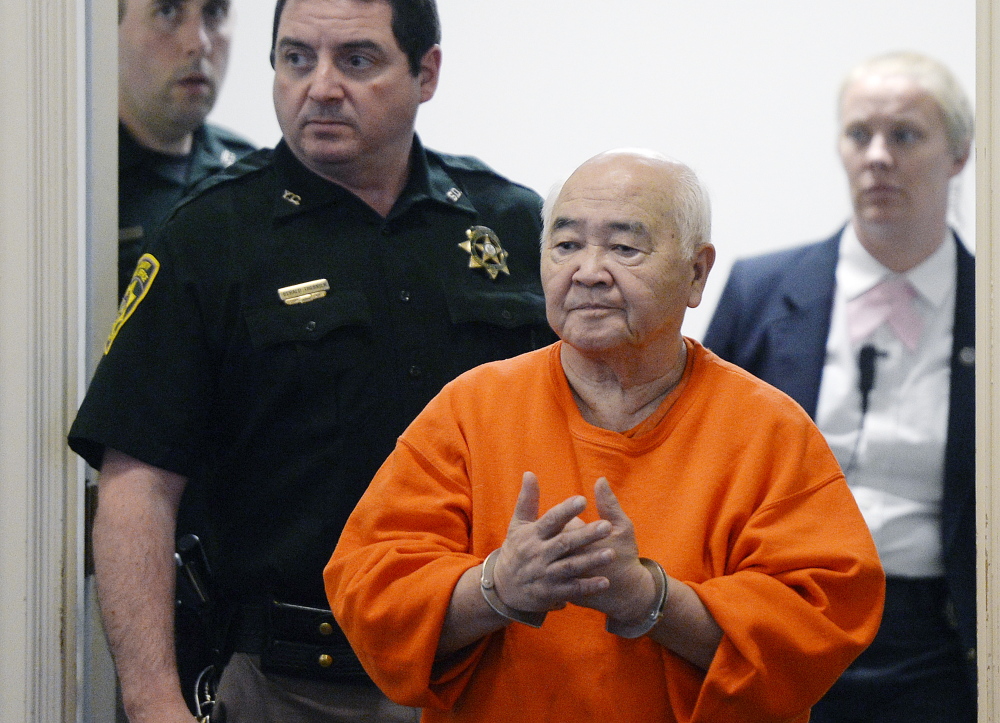The Biddeford man charged with killing two teenagers and wounding a woman in a shooting at the apartment he owned in 2012 has been found competent, for now, by the judge who is considering James Pak’s mental status to stand trial.
In his three-page ruling filed Monday in York County Superior Court in Alfred, Justice John O’Neil Jr. left open the possibility that Pak’s mental state could change over time.
“Mr. Pak does have significant cognitive deficits and difficulties with English and memory, and shall be required to be re-evaluated for competency prior to any trial taking place,” O’Neil wrote. “The passage of time, as well as the stress of confinement, are highly unlikely to improve his competency and may in fact have a deleterious effect upon it.”
Pak, 77, has pleaded not guilty by reason of insanity to two counts of murder in the deaths of Derrick Thompson, 19, and Alivia Welch, 18, and other charges related to the shootings on Dec. 29, 2012, in the apartment in Biddeford that he rented to Thompson and his mother.
Pak’s attorney, Joel Vincent, argued that Pak’s diminished memory makes him unfit to be tried for murder. But the judge said he was persuaded against that argument by the testimony of Robert Riley, a psychologist who examined Pak twice in 2014. Riley found that Pak understood the seriousness of the charges against him and could participate in his own legal defense.
“To ensure that Mr. Pak is able to meaningfully participate in trial, it will be necessary to set up a significantly organized trial plan to attempt to make sure that Mr. Pak is provided with adequate opportunity to process trial information as it occurs, and to take appropriate breaks to discuss events with trial counsel,” O’Neil wrote.
Police say Pak killed Thompson and Welch and wounded Thompson’s mother, Susan Johnson, 47, after a dispute over parking. Johnson called 911 after the shootings.
RULING A RELIEF TO SURVIVOR
Police had been called to the apartment earlier that day, but left after deciding the dispute was under control, just minutes before Pak allegedly shot the three.
Court documents say Pak waited for police to leave, got a gun, opened the door to the apartment and said: “I am going to shoot you. I am going to shoot you all.”
He shot Johnson first, then Thompson, then Welch, court documents say.
The two teenagers were dead by the time emergency responders arrived.
Vincent did not respond Monday to a call seeking comment on O’Neil’s ruling, and the prosecutor, Assistant Attorney General Leane Zainea, declined to comment.
Johnson, who has been frustrated with the time it has taken for the case to go to trial, said she was relieved by O’Neil’s ruling. She feared that Pak’s advancing age would keep him from ever being held accountable.
Johnson was shot once in the arm and once in the back. She has made a full physical recovery, but said she mentally relives the shooting every day.
“Especially to go through that and have to stand by, it seems like (Pak) has so many more rights than the victims,” Johnson said in a phone conversation late Monday afternoon. “I have no question, once he stands trial, he will be found guilty. Obviously, the trial will be super hard to go through, but at least I know what the outcome will be.”
Johnson said people often ask her what’s happening in the case against Pak, and she felt frustrated that, before Monday, she had no answer.
“There are days I just go back and reread the articles from the newspaper, and I don’t even know why I do it,” she said.
In making his ruling, O’Neil had to weigh the sometimes conflicting testimony by three psychologists at hearings in February and May.
Psychologist Kerry Drach testified that Pak showed signs of possible dementia, did not seem to understand the gravity of the charges, and had limited ability to grasp complex court proceedings.
But Drach said his exams of Pak in 2013 were inconclusive. He recommended more tests to assess Pak’s competency and whether he suffers from dementia.
DEFENSE PSYCHOLOGIST DIFFERS
Riley, the second psychologist, testified that he found Pak competent to stand trial and showing no signs of dementia.
The third psychologist, Melvyn Attfield, testified that he interviewed Pak four times at the York County Jail in Alfred and disagreed with Riley’s conclusions. Attfield, who was hired by Pak’s attorneys, said he found Pak was mentally impaired and had only the equivalent of a first-grade reading level.
Under the legal standard for competency in Maine, Pak must understand the charges and proceedings against him, comprehend how those charges relate to him, and be able to cooperate with his lawyers in a rational and reasonable manner.
Copy the Story LinkSend questions/comments to the editors.



Success. Please wait for the page to reload. If the page does not reload within 5 seconds, please refresh the page.
Enter your email and password to access comments.
Hi, to comment on stories you must . This profile is in addition to your subscription and website login.
Already have a commenting profile? .
Invalid username/password.
Please check your email to confirm and complete your registration.
Only subscribers are eligible to post comments. Please subscribe or login first for digital access. Here’s why.
Use the form below to reset your password. When you've submitted your account email, we will send an email with a reset code.